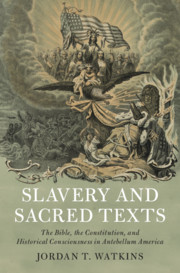CUP is publishing a new book on
the use and reading of the Bible and the Constitution during the slavery crisis
before the Civil War.
ABOUT THE BOOK
In the decades before the Civil
War, Americans appealed to the nation's sacred religious and legal texts - the
Bible and the Constitution - to address the slavery crisis. The ensuing
political debates over slavery deepened interpreters' emphasis on historical readings
of the sacred texts, and in turn, these readings began to highlight the
unbridgeable historical distances that separated nineteenth-century Americans
from biblical and founding pasts. While many Americans continued to adhere to a
belief in the Bible's timeless teachings and the Constitution's enduring
principles, some antislavery readers, including Theodore Parker, Frederick
Douglass, and Abraham Lincoln, used historical distance to reinterpret and use
the sacred texts as antislavery documents. By using the debate over American
slavery as a case study, Jordan T. Watkins traces the development of American
historical consciousness in antebellum America, showing how a growing emphasis
on historical readings of the Bible and the Constitution gave rise to a sense
of historical distance.
ABOUT THE AUTHOR
Jordan T. Watkins, Brigham Young
University, Utah
Jordan T. Watkins is an assistant
professor of church history and doctrine at Brigham Young University.
Previously, he was a coeditor at The Joseph Smith Papers Project.
TABLE OF CONTENTS
Acknowledgements
Prologue
Introduction
1. 'Recourse must be had to the history of those times'
2. 'The ground will shake'
3. 'Texts … designed for local and temporary use'
4. 'The further we recede from the birth of the constitution'
5. 'The culture of cotton has healed its deadly wound'
6. 'Times now are not as they were'
7. 'We have to do not … with the past, but the living present'
8. A 'Modern crispus attucks'
Conclusion
Epilogue
Index.
More info here


No comments:
Post a Comment